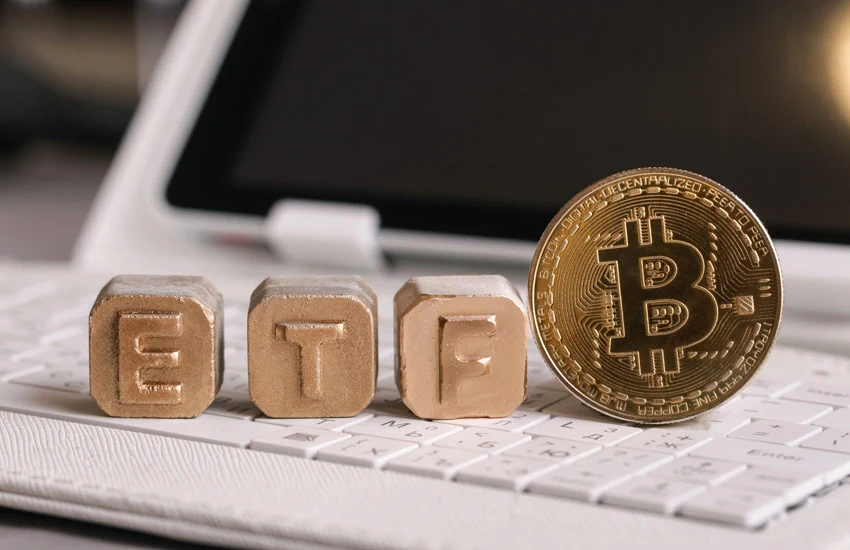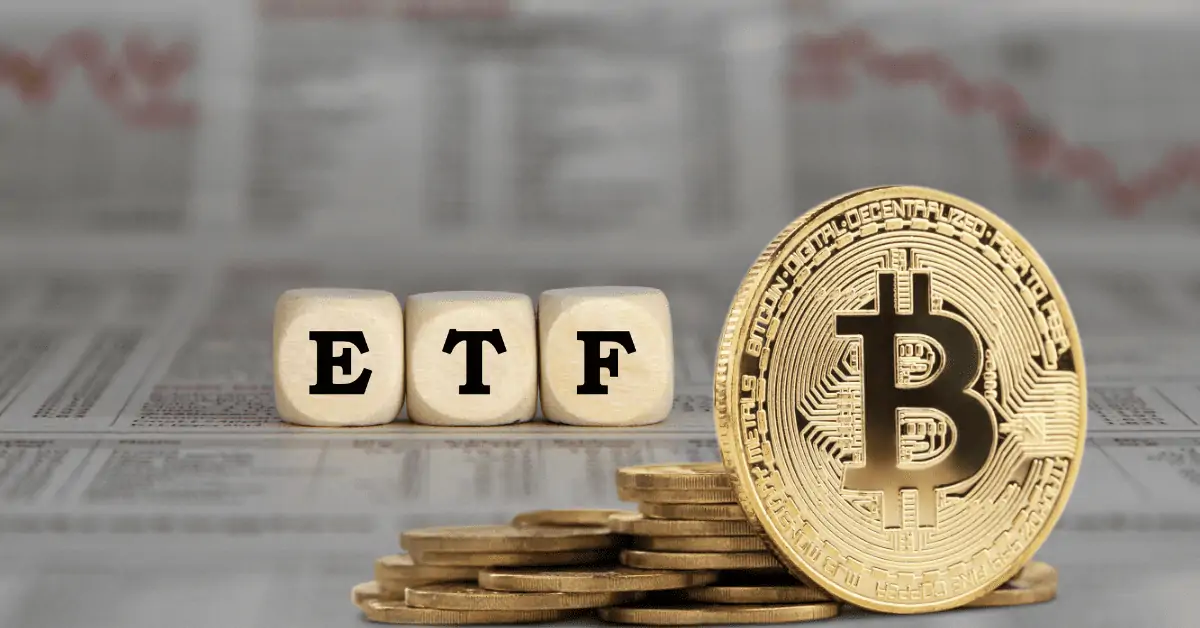
Exchange-traded funds (ETFs) based on blockchain technology invest in stocks of businesses that use blockchain technology to run their operations or make money. Blockchain technology is most renowned for its ability to keep decentralized records of cryptocurrency transactions, but it may also be used in a wide range of other industries. Examples of use cases include controlling video streaming services and safeguarding patient data.
Investors can now target a wider range of market sectors and asset classes thanks to the increase in ETFs available on the market. One approach to invest in a diverse group of businesses that might have cryptocurrencies on their balance sheet or use blockchain technology in other areas of their operations is through blockchain-based exchange-traded products (ETPs).
Twenty-five blockchain ETFs provide U.S. investors with access to companies implementing the technology as of January 2024.
How a Blockchain ETF Works
Blockchain ETFs provide a cost-effective way to participate in a carefully curated selection of equities that are unique to the blockchain. From the standpoint of an investor, these funds function exactly like any other ETF; you get access to a collection of blockchain industry companies in a single instrument that trades on an exchange like a standard stock.

Passive Management
Most blockchain exchange-traded ETFs in the United States are passively managed and follow the performance of an underlying index. As an illustration, the Nasdaq Blockchain Economy Index is a specially created index, and the performance of this index is tracked by the Siren Nasdaq NexGen Economy ETF (BLCN). Companies engaged in blockchain technology research, development, support, or use, as well as related enterprises, are included in this index. Every possible corporate stock that would be a good fit for the index is given a "Blockchain Score" by the index methodology. This score is determined by a number of criteria, including a company's contributions to the blockchain ecosystem, the maturity of its blockchain product and the corresponding economic impact, the investments and expenses made in R&D, the company's accomplishments, and its inventions.
The utilization of a factor-based technique guarantees a more accurate assessment of a blockchain company's potential in terms of actual economic returns, renewed commercial opportunities, and operational competence. This index comprises the 50 to 100 companies with the highest Blockchain Scores; these equities are also reflected in the BLCN ETF. Biannually, the index is rebalanced.
Active Management
Some blockchain exchange-traded funds (ETFs) choose to use an active management approach instead of depending on a proprietary index like BLCN. The Amplify Transformational Data Sharing ETF (BLOK), one of the largest U.S.-traded blockchain ETFs, with total assets of over $1.1 billion as of January 2024, making it an example of an actively managed fund.
BLOK ETF issuer Amplify thinks its active strategy allows its fund managers to "make timely decisions and identify companies that are best positioned to profit from the developing blockchain technology space." The fund pledges to allocate a minimum of 80% of its assets to equity investments in businesses that either generate substantial revenue from businesses connected to transformational data sharing or are involved in research and development, proof-of-concept testing, or the use of comparable technologies.
Holdings
Blockchain ETFs frequently invest in companies from the banking and financial sector, technology, IT services, hardware, internet, telecom services, and even biotechnology enterprises that may be leveraging blockchain-based systems or data sharing, whether they use active or passive tactics.
Stocks such as MicroStrategy (MSTR), Coinbase (COIN), Block (SQ), and Beyond (BYON), for instance, are held by BLCN. Among BLOK's top holdings are Riot Platforms (RIOT), Accenture (ACN), SBI Holdings (8473.T), a financial services firm based in Japan, MicroStrategy, and Coinbase.
As blockchain technology stays open and global, these ETFs feature companies from throughout the globe. Regionally, North American blockchain enterprises account for the majority of exposure for both BLCN and BLOK, with varying shares going to Asian and European firms.
Read Also: Non Fungible Token (NFT): Definition and Operation
Use of Blockchain Beyond Cryptocurrency

Blockchain technology is being used in a number of other industries than cryptocurrency. One factor is that technology is now present in different segments of the financial and banking industries. Blockchain is being used by financial institutions for regulatory compliance, cross-border trading, international payments, equity swaps, and client information protection.
However, blockchain technology has applications outside of the financial sector as well. The technology can be used to track products via the supply chain, integrate health care data, and assist media firms in safeguarding their intellectual property. The increased security and transparency offered by the blockchain could even improve government systems that deal with voting and identity management.
Risks of Blockchain ETFs
Blockchain ETFs are subject to the intrinsic risk of non-performance, non-adaptability, or the failure of the blockchain ecosystem due to their theme-based investment nature. Blockchain systems are becoming more and more popular, but the idea still depends on how the ecosystem as a whole develops, how stable and dependable the blockchain network is, how it is set up, and how well it is used.
An additional inherent risk is that blockchain exchange-traded funds (ETFs) can wind up investing in less mature, more prone to failure technological companies. Even while stock-specific risk is somewhat reduced by diversification through exchange-traded funds (ETFs), there is still a chance that some assets won't perform as expected.
Furthermore, blockchain ETF holdings frequently cross over with those of established internet and technology businesses. Businesses in the portfolio might get a bigger portion of their income from goods and services that aren't blockchain-based.
As an example, certain blockchain exchange-traded funds may mostly profit from networking hardware and computer processors, with a smaller portion coming from hardware utilized in blockchain-based systems. Such equities may only receive a tiny portion of their total revenue from blockchain parts, leaving the overall returns of the company susceptible to the underperformance of their non-blockchain sectors, which make up the bulk.
One also needs to be mindful of the expense ratio charged by funds and the trading charges levied by such ETF units. For instance, the expense ratios of BLOK and BLCN are 0.75% and 0.68%, respectively, which are substantially higher than those of a fund like the SPDR S&P 500 ETF (SPY), which levies a 0.09% fee.
Do ETFs for Blockchain Exist?
As of January 2024, there were 25 blockchain-related ETFs trading on US marketplaces, according to ETF information provider VettaFi. These funds invest in stocks of businesses that use and develop blockchain technology and solutions rather than holding or being tied to cryptocurrency prices, however their holdings and tactics may differ.
Do ETFs Based on Blockchain Hold Cryptocurrency?
Blockchain ETFs typically contain shares of businesses engaged in blockchain development. The funds don't typically hold cryptocurrencies, but if it doesn't conflict with the fund's guidelines, the companies that are part of the ETF may.
How Do I Make Blockchain Investments?
As of now, blockchains are not securitized. However, you can invest in a blockchain exchange-traded fund (ETF) to get exposure to a collection of blockchain-related businesses, acquire shares of firms that utilize and develop the technology, or buy shares of an ETF that holds bitcoin.
Conclusion
Blockchain exchange-traded funds (ETFs) allocate capital to a collection of firms engaged in blockchain-related operations. In addition to its many other uses, distributed database technology powers cryptocurrency transactions. While some blockchain ETFs are actively managed in an effort to take advantage of the most recent technical advancements, others aim to track the performance of specialist indexes.
